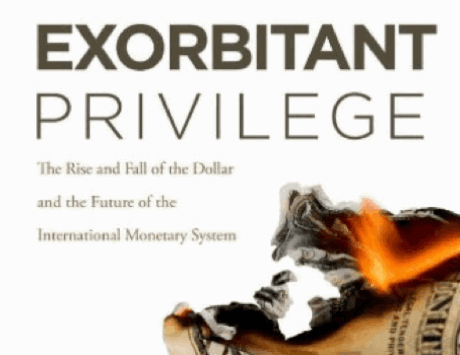By David Black
For the foreseeable future, the US government's inability — or refusal — to embrace fiscal responsibility will likely remain one of the global economy’s most pressing issues and one of its most reliable constants. Barring any radical and unforeseen change of course, this means that the US dollar is likely to continue to decline in importance. Private investors, along with foreign governments and their central banks, will gradually lose confidence in the notion that the US possesses the political will or ability to preserve the underpinnings of a healthy monetary system. Gone will be the latitude afforded by being the world's financial capital and holder of its reserve currency — what Charles DeGaulle and his finance minister 50 years ago labeled the United States' "exorbitant privilege."
That, at least, is a very real danger according to the economist Barry Eichengreen, who borrowed DeGaulle’s phrase for the title of his new book, "Exorbitant Privilege: The Rise and Fall of the Dollar and the Future of the International Monetary System." Eichengreen traces the history of the dollar from its rise to prominence in the decade between 1914 and 1924 — when the First World War brought the fall of the long-weakening British Pound — to the aftermath of the recent financial crisis, which Eichengreen judges to be the beginning of the end for the dollar’s status as the world's reserve currency.
Last week, Eichengreen spoke about his book at an event hosted by the World Policy Institute. He began by alluding to the most recent indication of a coming change in the structure of international currency markets: a front-page article in last Monday's Financial Times about a warning from Guido Mantega, Brazil’s finance minister, that the ongoing “currency war” could soon lead to a full-blown trade war. Brazil’s shot across the bow was directed at the United States, over its second round of “quantitative easing,” and at China, for its currency-manipulation. By injecting its recovering economy with stimulus (to the point of fiscal indiscretion) and stifling the appreciation of the yuan (to the hindrance of its own consumer class' development), respectively, the US and China are lending undue buoyancy to their own export sectors and making it harder for other countries to compete. Indeed, as Mantega noted, his country's trade with the US has "slipped from an annual surplus of about $15 billion in Brazil's favour to a deficit of $6 billion since quantitative easing in the US began."
For those who see the continued dominance of the United States in the world economy as a desirable end, the good news is solely short-term. For now, China remains a decade or so away from being a prominent mover in financial markets. Moreover, other developed-world currencies are in even more dire straits than the dollar — and many look to remain that way for the next couple of years. If the United States can get its fiscal house in order over the next decade, the dollar can remain one of the central currencies (and probably the leading one) for decades to come.
If the Washington fails to reign in massive budget deficits, insists on keeping interest rates close to zero, or turns again to "quantitative easing," it could provoke a dollar crisis, as foreign investors head for the exits, fearing the worst. A disaster of that magnitude is unlikely, Eichengreen argues, but the dollar's hegemony is unlikely to go unchallenged much longer: especially as China continues to grow stronger.
The financial crisis may have been to the United States what the First World War was to Great Britain, precipitating a weakening in its currency and perhaps compromising its centrality to financial markets. But it seems that it is already too late to prevent much of this process. The crisis merely accelerated trends that have been building since the fall of the Soviet Union: the rebalancing of the world's economies through greater openness to investment; the restructuring of the world financial system through a growing number of regional financial centers; and diversification and redistribution of the world's currency reserves. Indeed, the crisis has shown us very plainly the pitfalls of over-centralized finance and blind faith in the dollar. The real-estate speculation that precipitated the crisis stemmed from the fact that American lenders were fed too much rope because of the dollar's dominance and because international money managers faced a lack of alternatives perceived to be as reliable as the greenback.
Alternatives seem to be emerging now, and Eichengreen concludes that this is both necessary and good. He argues that a tripartite financial system — resting on the currencies of the US, Europe, China — will be advantageous for all. Of course, predictions are hard, and Eichengreen is careful to note that financial crises generally occur every three years, and their effects are impossible to foresee. Still, in theory, we can expect to see the emergence of a multipolar monetary order based upon a weighted basket of currencies — and that's likely to make us better off and the world a more stable place.
David Nelson Black is an editorial assistant at World Policy Journal.
